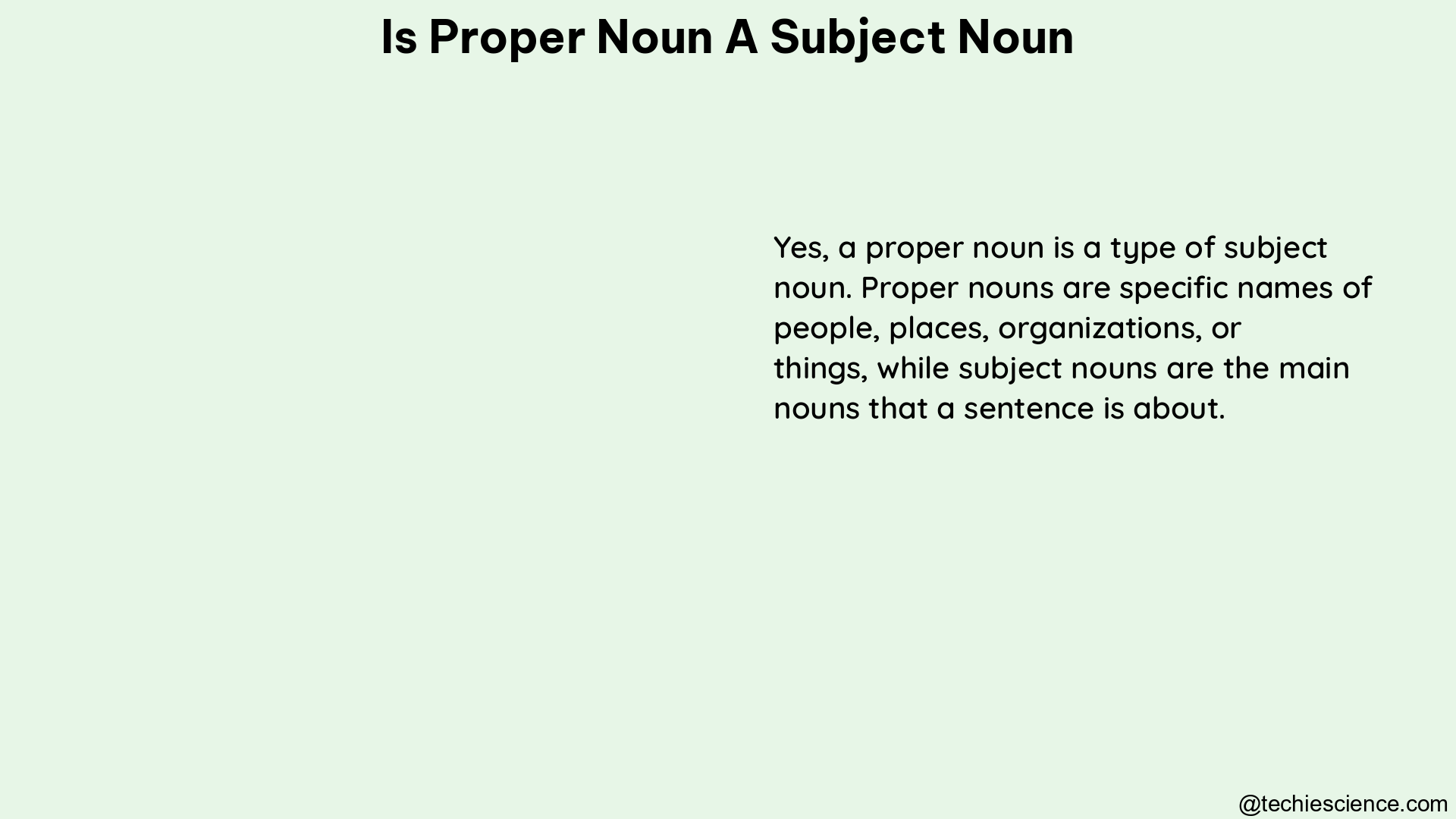A proper noun is not inherently a subject noun. While proper nouns can function as subject nouns in a sentence, the grammatical role of a noun depends on its position and function within the sentence, not solely on whether it is a proper noun or a common noun.
Understanding Proper Nouns
A proper noun is a specific name that refers to a particular person, place, or thing. Proper nouns are always capitalized in English to distinguish them from common nouns, which are general terms for things. Examples of proper nouns include:
- Names of people: John, Sarah, Michael
- Names of places: New York, London, Mount Everest
- Names of organizations: Google, NASA, United Nations
- Titles of books, films, and songs: “To Kill a Mockingbird,” “The Lord of the Rings,” “Imagine”
Proper nouns are unique identifiers that help us distinguish specific entities from others of the same type. They provide a clear and unambiguous way to refer to particular people, places, or things.
Understanding Subject Nouns

A subject noun, on the other hand, is the noun that performs the action described by the verb in a sentence. It is the noun that the sentence is about. For example:
- In the sentence “John is going to the store,” “John” is the subject noun.
- In the sentence “The dog is barking,” “the dog” is the subject noun.
The subject noun is the central focus of the sentence and is responsible for carrying out the action or state of being expressed by the verb.
Grammatical Specification
While proper nouns can function as subject nouns in a sentence, they are not inherently subject nouns. The grammatical function of a noun depends on its position and role within the sentence, not solely on whether it is a proper noun or a common noun.
Here are some examples to illustrate this:
- “John” is a proper noun and the subject noun in the sentence “John is going to the store.”
- “New York” is a proper noun and the subject noun in the sentence “New York is a large city.”
- “History” is a common noun and the subject noun in the sentence “History is a fascinating subject.”
In each of these examples, the noun serves as the subject of the sentence, regardless of whether it is a proper noun or a common noun. The grammatical function of the noun is determined by its role in the sentence, not by its classification as a proper or common noun.
Proper Nouns as Subject Nouns
Proper nouns can certainly function as subject nouns in a sentence, but they are not inherently subject nouns. Proper nouns can also serve as other parts of speech, such as objects, complements, or modifiers, depending on their role in the sentence.
For example:
- “John” is a proper noun and the subject noun in the sentence “John is going to the store.”
- “New York” is a proper noun and the subject noun in the sentence “New York is a large city.”
- “The Eiffel Tower” is a proper noun and the object noun in the sentence “I visited the Eiffel Tower during my trip to Paris.”
In these examples, the proper nouns “John,” “New York,” and “The Eiffel Tower” are serving different grammatical functions within their respective sentences, demonstrating that the grammatical role of a noun is not solely determined by its classification as a proper or common noun.
Conclusion
In summary, a proper noun is not inherently a subject noun. While proper nouns can function as subject nouns in a sentence, the grammatical role of a noun is determined by its position and function within the sentence, not solely by its classification as a proper or common noun. Understanding the distinction between proper nouns and subject nouns is an important aspect of English grammar and can help students effectively communicate and analyze the structure of sentences.
Reference:
- https://homework.study.com/explanation/are-school-subjects-proper-nouns.html
- https://walton.uark.edu/business-communication-lab/resources/downloads/nouns.pdf
- https://www.grammarly.com/blog/proper-nouns/

Hi…. I am Goutam Datta. I have completed a double M. A. in English and B. Ed. I am a creative writer. Currently, I am a part of the LambdaGeeks.